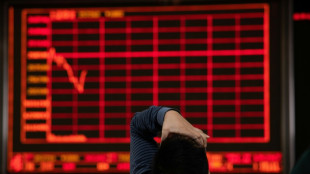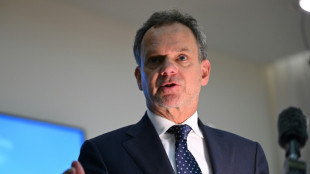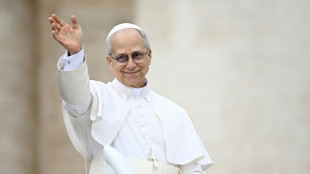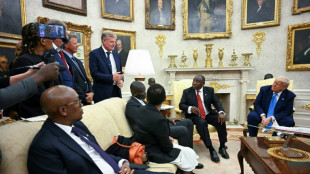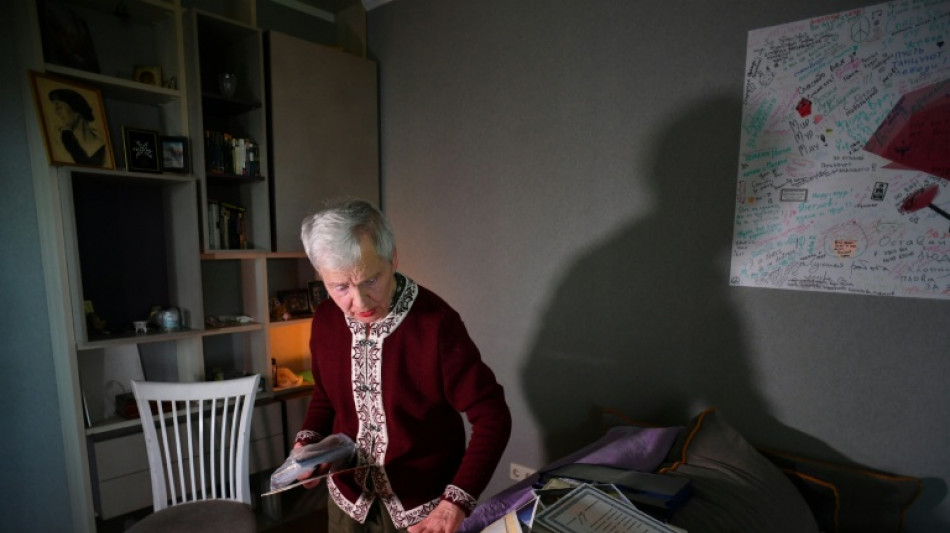

'Hurt': Leningrad Siege survivor, 84, charged over peace placard
Lyudmila Vasilyeva, 84, survived the Siege of Leningrad in World War II as a child. Now, the Russian pensioner faces prosecution for calling for peace in Ukraine and says she feels "hurt" over what her country has become.
Like thousands since Russia launched its military offensive in February 2022, she has been charged with "discrediting" the armed forces and is due in court on Friday.
"Bitterness. That's what I feel. I'm unbearably hurt, unbearably hurt for the country," she told AFP in an interview in her Saint Petersburg apartment.
Dressed in a burgundy cardigan with patterned trim, she displayed the object at the centre of her legal troubles -- a handwritten placard with a simple message.
"People, let's stop the war. We are responsible for peace on the planet Earth. With love, Lyudmila Vasilyeva, child of the Leningrad blockade."
In March she had stood on the street holding it in front of her.
More than three years into Russia's offensive on Ukraine and an escalating domestic crackdown, such an act was enough for prosecutors to bring charges against Vasilyeva.
She faces a fine of up to 50,000 rubles ($620) for the administrative breach -- relatively lenient compared to the years-long jail sentences handed out to some who have criticised the Ukraine offensive in stronger terms and faced criminal punishment.
Russia's military campaign has left tens of thousands dead -- including many Russian soldiers -- and seen Moscow's army extend its control to around a fifth of Ukraine's territory.
At home, Moscow introduced military censorship and has escalated a crackdown on those who criticise the offensive.
Amnesty International, which Russia outlawed earlier this week, said laws against "discrediting" the army have "been used to criminalise the expression of any opinion critical" of the military campaign.
- 'Always' with the weak -
Vasilyeva is unapologetic.
"I have always been someone who is not indifferent, from childhood. I have always been on the side of the weak," she said.
Two elegant cats were frolicking among her books.
On the wall hung a portrait of her mother, who survived the siege with Lyudmila and her four siblings.
"Mum always said: 'We will get through everything, as long as there is no war'," Vasilyeva said.
The Siege of Leningrad -- the Soviet-era name of Saint Petersburg -- began in September 1941 and lasted 872 days.
Between 600,000 and 1.5 million people died, most from hunger, before the Red Army eventually broke the siege in January 1944.
It has totemic importance for many Russians, including President Vladimir Putin, whose brother died in the siege and who was himself born in the devastation of post-war Leningrad.
Vasilyeva said her mum "donated blood to get extra food rations".
The experience has influenced how she sees the Ukraine conflict.
"We always talked about peace. Remember what happened so that it never happens again. And what are people saying now?"
since authorities put down a wave of street protests in February 2022, when Russia launched its offensive, signs of domestic opposition have largely subsided.
Putin says the whole of Russia is behind the campaign, and pro-offensive voices and prosecutors cast dissenters as outliers to be punished and ostracised.
"There are lots of decent people. But they have been scared," said Vasilyeva, a veteran of Russian opposition movements
She saw the period of perestroika in the late 1980s -- Mikhail Gorbachev's reforms designed to open-up and revitalise the stale Soviet system -- as a "window to freedom".
- 'People can influence' -
After the Soviet Union collapsed, she joined the liberal Democratic Choice party, founded by reformist prime minister Yegor Gaidar.
"I have always participated in all opposition meetings," she said proudly.
"Let people live and choose for themselves what they want. Don't impose anything on them please," she said.
It was in that spirit that her placard appeal was aimed not at the authorities but at her fellow Russians.
"It is the people who can influence and stop (the war) and I addressed them," she said.
Russia calls its campaign against Ukraine a "special military operation".
Public calls for peace -- even without explicit references to Ukraine -- are essentially outlawed.
But Vasilyeya, who faces a fine and the possibility of harsher punishments if she is charged again, is unfazed.
"I'm 84 years old. I'm not afraid."
K.Parker--VC




